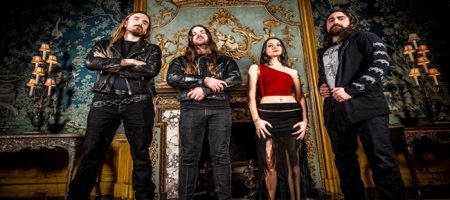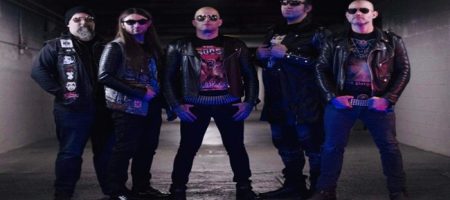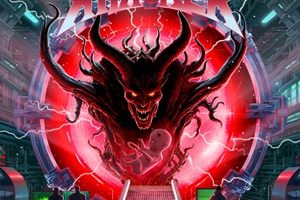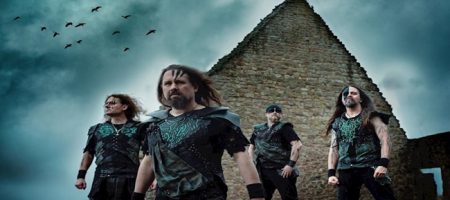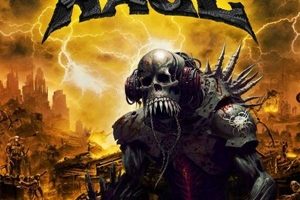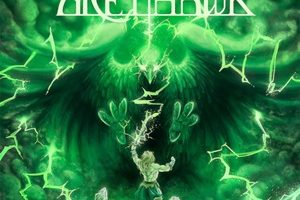Bloodbound – Powerhouse Tales
Thursday, 13th July 2023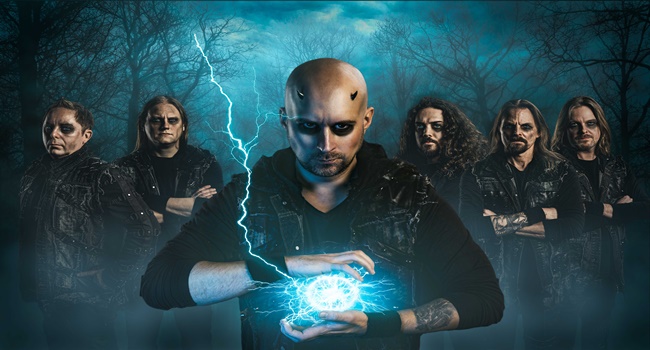
Closing in on a twenty-year career, Swedish act Bloodbound arrive at their tenth studio album with Tales from the North. A reliable force on the heavy/power metal scene, this energetic effort encompasses all facets of what make them headliners – engaging, melodic chorus work, supplementary uplifting musical hooks, spirited double kick-fueled tempos, and the exhilarating keyboard/guitar passages that take the listener into a world of fantasy, dragons, warriors, and lands far away. From Celtic folk elements or Sabaton-esque key orchestration diversity should win over long-timers while inviting newcomers to join in the festivities.
We reached out to vocalist Patrik Selleby to discuss the consistent effort behind their studio records, steady songwriting craftsmanship, how he was able to join Bloodbound, initial fears being on stage performing after Gamma Ray, thoughts on streaming services versus the special physical box sets the band delivers, his work with bands like Dawn of Silence, Shadowquest, and Tales and Legends, and what’s on the agenda over the next year for the group.
Dead Rhetoric: Tales from the North is the tenth studio album for Bloodbound. How does it feel to be in the group now that’s reached that milestone in your career? And were there any specific parameters set out with the writing/recording of this material that maybe differed from your last effort Creatures of the Dark Realm from 2021?
Patrik Selleby: We have been working in the same way as we have over the past five albums. Myself, Fredrik and Tomas are the main songwriters in the band. The writing process is an ongoing process all the time. If I have a riff, I record it and save them in the vault for later. When we start to talk about things at the time to do an album, we start to send each other files to see what we have, what kind of material we have. And then we build an album from that. We just try to write as good of songs as possible.
I’ve been on seven of these albums. I was a huge Bloodbound fan from the beginning, and now we’ve done seven albums together. We are like best friends that enjoy doing music together. We really enjoy each other’s company.
Dead Rhetoric: Tell us about the video shoots for the title track and “Drink With the Gods” with Rainer Fränzen of Und Action – where did you film the band scenes versus the narrative aspects? How important do you believe the visual medium is when it comes to the promotion of the albums and the band in general?
Selleby: It all started with AFM Records having contact with Rainer. They asked him if he could do videos for us. We recorded the two videos at the same time, in Bollnäs, here in Sweden. Rainer and his friend came from Germany to shoot those videos. He had made the script; he knew what he wanted. We shot those videos, and we did what he told us with his vision. We met him before and talked about some ideas, what we could do. I think it turned out really great.
Everything, the music together with the visuals, create something. You need a whole package. The cover art, artwork for the album, and videos are really important. I think also that we don’t have the kind of money we would need to do the kind of videos that we really want to. With that said, I think Rainer did great work with the budget that he had.
Dead Rhetoric: Did you hire some local actors to do some of the narrative scenes?
Selleby: For “Tales From the North” we used Mika (Mikael Planefeldt), he’s the bass player in NorthTale. We were on tour, we had NorthTale as support, we started to talk about this. We needed a Heimdall for the video, Mikael is perfect for this part. We asked him to do that, he wanted to do it. He lives in Gothenburg, which is far away from Bollnäs. Rainer stopped in Gothenburg on his way to Bollnäs and recorded those parts for Heimdall. Otherwise, we did everything ourselves.
Dead Rhetoric: Where do you see the importance of Jonas Kjellgren in terms of his mixing/mastering skills? Do you believe the outside set of ears objectively allows the final product to stand out that much more?
Selleby: Yeah, we think Jonas is really good at what he does. We have had him mixing and mastering all the albums since I joined the band. Why change something that works? He knows what we want to sound like, so the mixing process is very smooth. Of course, we sent the songs back and forth a little bit until we were all happy with it. He knows the foundation of what we want, so it’s very easy to work with him.
Dead Rhetoric: How would you describe your evolution within Bloodbound from your initial work on Unholy Cross to today? Did you have any fears of being accepted as the vocalist after the stage had been set with the work of Urban Breed and Michael Bormann on the first three albums?
Selleby: I was in the beginning; on the first album I was a huge fan of the band. The reception from the start was mind-blowing for me because I was totally accepted from the fans in the beginning. There were a few people who thought it wasn’t as good as with Urban, but I was overall very accepted and totally relieved. Now I’ve been in the band for twelve to thirteen years, I’ve done seven albums with them, Urban did two albums with them, Michael only did one album, so I can say that I am the main vocalist of Bloodbound.
Dead Rhetoric: Did the work you did with Dawn of Silence before prepare you for the leap you made into Bloodbound?
Selleby: Yeah, in a way. Because I never saw myself as a vocalist. In Dawn of Silence, I was a guitar player, and they didn’t have a singer. I just started to sing at one rehearsal, and the other guys were like, ‘this doesn’t sound too bad – can you keep doing this?’ I said yes, I could do it until we find someone else. I booked Bloodbound for a show in my hometown, and we had an afterparty after the show. They asked me to play my band for them – they thought I sang really well. We kept in touch a little bit, and when they needed a new vocalist, I was the first on their mind. I was really happy about that.
When Bloodbound asked me to join the first time, I was only to do the vocals, without playing guitar. Then I was like, am I a singer now full-time? Today I am more of a singer than a guitar player, but back then I wasn’t. It made me develop as a singer.
Dead Rhetoric: With multiple songwriters in the band, is it a tough process to pick and choose what goes on each album? Or do you start with a theme and work your way down from there?
Selleby: A little bit of both, I guess. When Tomas is writing the lyrics, he also is the guy who comes up with the themes. When he presents a theme and a few songs with that theme, we then have a starting point. And then we can finish an album. We are working on material all the time, but when we have a theme, we have a foundation that we can build upon.
Dead Rhetoric: Now that you have just turned forty this year, what sort of goals do you set and wish to fulfill that may differ when it comes to your musical career than say during your twenties and thirties?
Selleby: I have actually reached all my goals. My first goal was to release an official album, now I’ve been on seven with Bloodbound, two with Dawn of Silence, two with Shadowquest, one with Tales and Legends. I’ve played at the biggest European festivals; I’ve done headline tours. I don’t really have a goal more than that we will keep getting bigger with Bloodbound. With that said, we still have our day jobs, we don’t give the band 100% of our lives because a lot of the other guys have small children. We only choose what we want to do, we are privileged in that way. We are not out playing all the time, and we are probably bigger than we deserve in a way.
Dead Rhetoric: What do you consider some of the career highlights that you’ve had – specific albums, videos, tours, festival appearances, or other situations that will stay forever embedded in your memory banks?
Selleby: Of course, when we did our first headlining tour, and it was pretty much a success, we realized that we could now go out on our own, that we didn’t have to go out as a support band anymore. We could make it financially good, and we kept on doing headline tours. One festival I remember is the first really big festival I did with Bloodbound. We were at Masters of Rock in the Czech Republic. It was my second gig with the band, we only did one club show in Sweden before that. There were so many people there, I was totally scared. I didn’t know how the fan reaction would be – and we were playing after Gamma Ray. I am a big Gamma Ray/ Helloween fan, they were doing the last songs and we were standing behind the stage. They were doing “Ride the Sky”, “Future World”, “I Want Out”, and I was kind of shitting my pants. The gig was really fun to do, and that was the first really big show for me.
Dead Rhetoric: Aside from ProgPower and 70,000 Tons of Metal, Bloodbound has not played in the US. Have there been any talks of having a US tour at some point?
Selleby: Yes. We got a really nice offer a couple of years before the pandemic to do a really huge tour there. But financially it was too risky for us. We didn’t know if we would come home with any money at all, and we would need to take a one month break from our day jobs. We all have houses, and we really wanted to do it, but we couldn’t. I think also since we are doing one tour a year, and then doing some festivals, we are focusing on Europe. We want to go to the states, but it would be so much work, and cost us a lot of money. We don’t have any plans right now, but that tour was really sad to turn down.
Dead Rhetoric: How does your involvement and approach with Shadowquest and Tales and Legends differ from your work in Bloodbound? Do you enjoy the different levels of interaction and creativity with other musicians that becomes beneficial in the long run?
Selleby: Yeah, like Shadowquest – I grew up listening to Ronny’s band Dionysus, and Jari with Stratovarius. I was really glad when they asked me to join because I know Ronny is a really good songwriter. But there, it’s more like I’m a singer in a project. We’ve done only a couple of shows here in Sweden, and they were a lot of fun. Now we haven’t talked in years, I have no status as to what is going on. I’m not sure there’s going to be anything more going on with Shadowquest. Tales and Legends, they reached out to me to record the album. I’m just the singer there, I have nothing to do with the songwriting. I sing what they want me to sing. That’s also more of a project. The main focus for me is Bloodbound. Because I’m more involved in the songwriting, that’s a real band with my friends.
Dead Rhetoric: What is a pivotal or critical moment that helped shape your musical career?
Selleby: For sure it was when I was asked to join Bloodbound. I knew then I would be a singer now. I moved up to a more professional level, because in my previous bands we only played shows very locally. Never outside of Sweden. That was a huge leap for me to join Bloodbound.
Dead Rhetoric: What would surprise people to learn about the band as far as your relationships and how you handle the business side of things compared to what they hear musically or seeing the band live?
Selleby: People think that we are living off of the music, that all we are doing is working on the music. We are very spread out in Sweden; we don’t really rehearse much because the distance is too far between each other. We meet up at the airport when we are going out to play at shows.
Dead Rhetoric: Do you have a preference for the studio or the stage – or do you like both equally for different reasons?
Selleby: I enjoy the songwriting process. The recording process is always a lot of pressure, you want to deliver especially as a vocalist to have a really good day to do things on the highest level. It can also be very frustrating. When it goes well, it’s a lot of fun, especially when you come to the part where you hear the end result. It’s very rewarding. If I had to choose one, I really love to do the live shows. To be together with the audience, to feel the crowd, that’s the main reason why I do this.
Dead Rhetoric: Is it a challenge now to come up with the best setlist with ten studio albums to choose songs from?
Selleby: It’s getting harder and harder, of course. Now we have to take out some songs – we are looking at the streams a little bit more to see what kind of songs are the more popular. From the new album, we always choose what we think will work live. But it’s getting harder and harder, almost impossible to play all the songs that we want.
Dead Rhetoric: Several artists have recently been talking about issues with streaming services and losing money, while others have been defending it. Since Bloodbound started after the whole Napster debacle, but before services like Spotify really took off, what are your thoughts on this evolution of the music industry?
Selleby: I’m actually really conflicted because in a way – the music spreads to more people, but the record sales are going down. The record sales are where the artists make money. It’s very good for new bands, but the market is getting full. There is too much music, it’s very hard to do something that stands out from the crowd. I’m conflicted in that discussion.
Dead Rhetoric: Is that why you put special attention to details in a box set for this record?
Selleby: Yes, the record label tries to find other ways to convince people to buy the record. People don’t just want to buy the CD anymore, so they try to find special items to help. I think it’s very nice to have more than an album, a poster flag, a statue in the new box set. As a fan, that’s something that I want – more than just the music if I buy something. It’s a good way to give something more to the fans, even if they have to pay for it.
Dead Rhetoric: What are some hobbies or activities that you like to pursue away from music when you have the free time and energy to do so?
Selleby: I like to just be at home. I work a lot with music, write music all the time. More of a hobby now is to be starting to produce a little bit and learn the technique behind the recording. I’m not on the highest professional level but I’m getting better all the time. I have a wife and a dog that I try to spend as much time with as I can.
Dead Rhetoric: Being a veteran artist, I’d imagine you have a lot of younger musicians that ask your advice. What types of ideas do you try to impart on them?
Selleby: This is the first time I’ve been called a veteran! (laughs). Not particularly, but I try to give tips to younger bands if I have the chance to. Think about this, a lot of younger bands have unrealistic thoughts about things. Today, the best way isn’t to have a manager, or a record label right away. Be careful with those types of things, writing contracts, it should be with record labels that are still in business or have been there for a long time, so you can keep an eye on them. Don’t just sign a contract because it sounds good, if you don’t know anything about it. I talk with younger kids about the music industry and how it is.
Dead Rhetoric: What’s on the horizon for Bloodbound over the next twelve months when it comes to activities?
Selleby: First of all, we are going to do some summer festivals. We will do Rock Hard on the same day as the album release, signing session, meet and greet. The week after, Masters of Rock, again. We have some plans in the autumn, but I can’t speak on that right now as it’s not official. When it comes to writing music, we do it all the time. No complete songs though as of yet.











